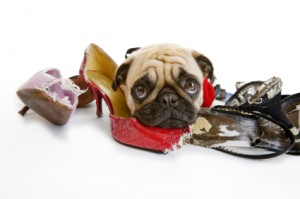Pet Proofing Your Home
One of the most important and cost effective things you can do to ensure the safety of your pet is to “pet proof” your home. Pet proofing means removing dangerous items from your pet’s reach, being aware of the many potential hazards that your pet may encounter and thinking ahead about situations which could cause your pet harm.
As Pet Sitters we’ve seen some pretty hilarious things as well as some horrible situations. Some of the most common issues we see are dogs having easy access to very dangerous food items, chemicals, drugs and medications, and trash cans.
- chocolate
- grapes
- raisins
- onions
- garlic
- nuts
- tomatoes
- fruit pits
- chicken and all other cooked bones
- coffee grounds and beans, and
- alcohol, to name a few.
Household dangers include choking and obstruction hazards such as:
- food wrappers
- plastic bags
- coins
- small toys
- hair ties
- rubber bands
- small clothing items like socks and underwear, shoes and laces
- electrical cords
- rawhide bones
- holiday decorations
- string and yarn (especially for cats)
- batteries. Batteries in fact are not only choking hazards, but we’ve also seen extreme burns and abscesses of the tongue and soft tissue of the mouth because dogs have chewed through the battery casing and were burned by the acid inside.
There are also over 700 house plants that are poisonous to our pets including:
- Lilies
- Tulips
- Azaleas
- Poinsettias
- Bird of Paradise
- Daffodils
- English Ivy
- Hyacinth
- Holly and Mistletoe (see our upcoming tips on preparing your pets for the holidays).
We’ve also seen pets become very ill and even die from ingesting human medications like:
- Ibuprofen and other pain killers
- vitamins
- prescription medications
- cold medications
- cremes and ointments
- and even flavored prescription medications for your pet that were left out where the pet could access the entire bottle.
Other household dangers include anti-freeze, cleaning products, fertilizer, garden chemicals, rodent poisons and pesticides, insecticides, mulch, and de-icing salt.
If you have a pet that has the propensity to rummage through the trash can, please keep the can in a latched cabinet or buy one with a closable lid that snaps shut. If you have a larger breed dog then this is a moot point because s/he is capable of figuring out how to pop it open or simply knock it over spilling the contents on the floor. Dogs can smell 100 times better than we humans and can be ingenious and diligent at acquiring something they smell in the trash can.
We see many “counter surfing” dogs too, so please be conscious of what types of things you leave out oncounter tops, bed side tables, end tables, and coffee tables. Also be sure to close the toilet bowl lid to prevent drowning of smaller pets and to keep your dog from drinking any harmful cleaning chemicals and bacteria.
Our feline friends are certainly not immune to these dangers. In addition we know that cats and kittens love warm places, so please make sure that they haven’t found a comfy spot in or behind the dryer before you start it. Be aware of where your cats are before you close doors, closets and drawers. We have found cats unknowingly locked in bedroom closets and coat closets many times during our first visit to a home. Be sure to adjust any loose draw strings from curtains or blinds. It can be very easy for them to become entangled and possibly choke themselves. Repair any broken or torn window screens as this could be a possible escape route or deadly falling hazard for a pet. And be sure that all heating and air vents have appropriate covers to keep cats from exploring and becoming trapped in the ducts.
Should your pet encounter one of these dangers it’s important for you to know the danger signs and symptoms of pet poisoning. These can include vomiting, diarrhea significant or foamy salivation, lethargy, difficulty breathing, seizures, or paralysis.
Ultimately your pet’s health depends on you, so please do everything you can to provide a safe environment for them. Knowing the many potential hazards can help you keep your pets safe, healthy and happy.

